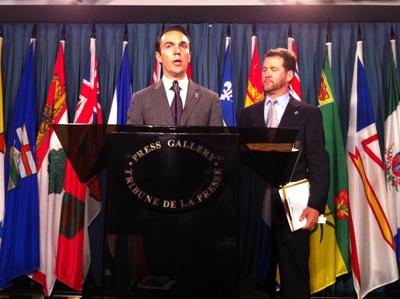The Canadian Parliamentary Coalition to Combat Antisemitism (CPCCA) tabled its final report on July 7. Read the full text of the report below.
Gay former Liberal MP Mario Silva, who served as the chair of the CPCCA inquiry panel, and Conservative MP Scott Reid, the steering committee chair, presented the report to journalists, saying that Canada is witnessing an “unprecedented increase” in anti-Semitic incidents and hateful discourse.
“We are concerned with the continuing existence of anti-Semitism here in Canada,” says Silva. “Recent data from Statistics Canada reports that there has been a 42 percent increase in hate crimes in 2009 and a 71 percent increase in religious-motivated hate crimes targeting the Jewish community.”
Silva is referring to a June 7 StatsCan release that also showed an 18 percent increase in reported gaybashings for the same period.
The CPCCA report draws upon the Ottawa Protocol, which was tabled by the Inter-Parliamentary Coalition for Combating Antisemitism, an international alliance of parliamentarians that works together to combat anti-Semitism, at its second annual conference, held in Ottawa in November 2010. The report stresses that criticism of Israel is not anti-Semitic, but “singling out Israel for selective condemnation and opprobrium — let alone denying its right to exist or seeking its destruction — is discriminatory and hateful, and not saying so is dishonest.”
After 10 hearings, from November 2009 to February 2010, in which 74 witnesses were heard from and more than 150 written submissions received, the panel released its recommendations. They provide a break down into five key areas: developing national standards for police services in reporting hate crimes; creating a means for all organizations — police, human rights commissions and not-for-profit agencies — to pool information about anti-Semitic incidents in Canada; using our immigration system to help those targeted by anti-Semitism overseas; ensuring that the education of newcomers to Canada includes human rights information; and recommending that the Commons foreign affairs committee study the work of the United Nations Human Rights Council with regard to the equity of allegations raised against Israel versus those raised against other states.
The issue of developing standards for the reporting of hate crimes stemmed largely from recommendations made by then-Ontario Provincial Police commissioner Julian Fantino, who is now a Conservative cabinet minister.
The report recommends establishing “national standards for police services across the country so that we have a common understanding of what constitutes an anti-Semitic crime, together with consistent across-the-board mechanisms for data reporting and statistical analysis.”
It also recommends that police services across Canada begin reporting hate crimes broken down by targeted communities.
“This would assist in determining what other forms of hate crime exist and where they’re occurring, towards which groups, so it would help all these groups,” Reid says. “I think it’s the same vis-à-vis racially motivated hate crimes, that there ought to be a more thorough breakdown.”
Queers Against Israeli Apartheid (QuAIA), the group at the centre of the Pride Toronto censorship controversy, supports a strategy of boycott, divestment and sanctions against Israel. Read about the group here, and its responses to many of the criticisms against it here.
So does QuAIA’s messaging fall under the CPCCA’s definition of anti-Semitism?
“It’s not just offensive, but it’s a total lie, given that Israel is probably the only country in the Middle East where gays and lesbians can actually live freely and not be harassed by the authorities,” Silva says of the group. “I find that’s a distortion of the truth, and I certainly don’t support that organization or what they stand for, and I think a lot of people in the gay community don’t support it as well.”
Silva adds that he is happy that the Ontario legislature unanimously approved a motion to condemn Israeli Apartheid Week events on campuses, which he says have support from QuAIA.
Read the transcript of debate on the March 25 Queen’s Park motion here. The unanimous vote, where 30 of the 107 MPPs were present, was not connected to any legislative action. Further, there is nothing in Canadian jurisprudence to suggest that criticism of the state of Israel or Israeli foreign policy, or indeed criticism of any government – foreign or domestic – constitutes hate speech under the criminal code or any of the various Canadian human rights codes. In an April 12 report to the executive committee of the City of Toronto, city manager Joseph Pennachetti wrote that the phrase “Israeli apartheid” does not violate the Criminal Code, the Ontario Human Rights code or the City of Toronto’s anti-discrimination policy.
Still, Israeli Apartheid Week activities received much study in the CPCCA report, despite the CPCCA’s admission that it is hard to pinpoint whether there is an actual problem of anti-Semitism on university campuses.
“First of all, they may be policies we just disagree with, and secondly, perhaps we regard them as being overly aggressive or in bad taste,” says Reid. “Those things are nevertheless defensible on free-speech grounds; we make that point in the report. However, there is a point that gets crossed where you start getting the phenomenon of individuals feeling intimidated by being on campus, afraid to express their Jewishness or their support of Israel, which is also an important political position with which others may disagree, but which they ought to disagree [with] in a manner that respects freedom of speech — a fundamental Canadian value.”


 Why you can trust Xtra
Why you can trust Xtra


